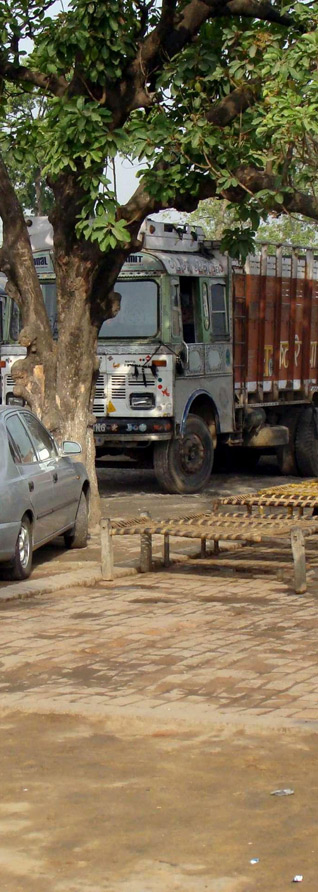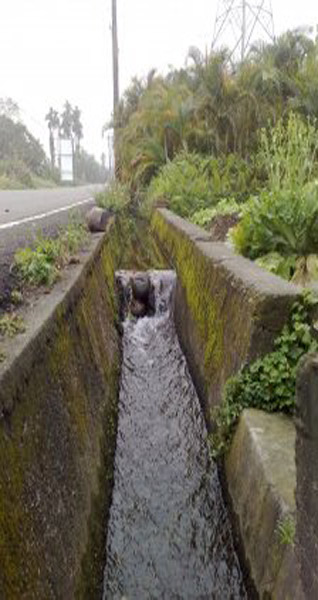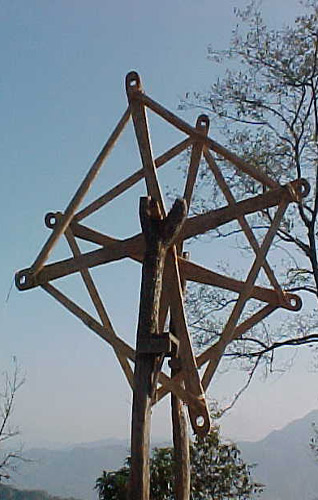Daily Fix
Paradise Lost
T. SHER SINGH
DAILY FIX
Friday, June 15, 2012
No matter when or where or how I now travel, I find that I am forever trying to replicate - but am only seldom able to - the pleasures I encountered on family road-trips during my childhood.
Not coincidentally, each of these pleasures was either inexpensive or did not cost anything at all. It was the simplicity, the directness, the clarity of the experience, that produced the unadulterated joy.
Our home was in the Gangetic Plains. Which meant that the summers were hot - white, searing, sauna hot.
Our family was middle-class and could therefore afford the annual summer exodus to the “hill-stations”. Not unlike the way we in Canada flee in the winter in search of the sun, back on the subcontinent, we fled from the sun and headed for the cooler mountain-tops.
Of course, the price you had to pay for the relief in the mountains was the purgatory of the drive to them, which would take anywhere between two and four days, depending on which hill resort you were heading for.
We would start in the wee hours of the morning, while it was still cool. This was necessary because the cars then did not have airconditioning.
By 11 am, we’d be exhausted. The sun above, still short of its zenith, would’ve already turned the auto into an oven. The open windows only brought in hot molten air. It instantly soaked up every trace of moisture we carried.
The vote would be unanimous: we wanted to stop at the very next ’dhaaba‘.
A dhaaba is the subcontinent’s equivalent of the truck-stop, but has no equal anywhere in the world. It is an oasis just off the roadway: a cluster of thick trees, with a couple of large, thatched huts standing in the shade. A few rickety tables and chairs scattered around.
The preferred furniture, however, for the road-weary was always the munji, also known as the chaarpai - literally, the four-legged one: a cot the size of a single bed, consisting of a simple wooden frame strung together with a spider's web of soft rope. No sheets, no pillows.
A dhaaba - an authentic one, not the glitzy imitations that have sprung-up all over the land nowadays - is run by truck-drivers.
When a driver on the road has been at it for a long stretch and needs a break, he offers to be the cook at the dhaaba, or serve as general help. The incumbent cook takes over the driving and disappears into the sunset.
Thus, it is a truck stop run by truck drivers … in relay. Mostly, it is a non-profit set-up, a sort of a co-op. It pays those who work there, but only minimally, since they are merely taking a break. In return, the truck-drivers who are away from home for weeks at a time, get to eat ’home-cooked’ meals at negligible prices, three times a day!
The food is basic, rustic and wonderfully sumptuous.
My favourite was the aaloo paranthaa - a roti-like bread, stuffed with mashed potatoes, and crowned with a generous chunk of freshly churned butter. Accompanied by a rich glass of lassi, a yogurt-based sweet beverage, served in a “Punjabi” glass.
‘Punjabi glass’ was the slang for an over-sized, doubly-tall, steel tumbler, named thus because, according to popular lore, it took a lot to quench the thirst of the burly Sikh from the Punjab.
The adults in our entourage preferred the famous ’makki-di-roti’ and ’saag’ combination - corn-bread and spinach - and embarrassed us with their ecstatic oohs-and-aahs while we rolled our eyes in bewilderment. Fuss over spinach? Sick!
Having stuffed ourselves into inaction - adults and children alike - we claimed a munji cot each, dragged it to a spot in the shade, and slid into a siesta.
The sun’s disappearance behind the trees around five in the afternoon would drop the temperature noticeably enough to wake us up.
Time to get back on the road.
* * * * *
The next thing we looked out for was a brook or spring close to the road. It wouldn’t be hard to spot. Cattle or goats would invariably be in the vicinity.
It was a time, I should remind you, before the world had invented pollution as a lifestyle. The water, coming afresh and straight from the lower Himalayas - which were still out-of-sight - would be crystal clear and, kissed by the evening air, perfectly cool and ever so invigorating.
We’d find a spot behind some trees, out-of-sight of the road-traffic, strip down to the bare essentials, and wade into the spring. It was never more than waist-deep, never big enough to form a pool. Which meant more of an adventure for us kids. The temperature would be, ah, so perfect!
Back in the car, cool and alive again, we’d lower the windows to welcome the evening breeze as we headed once again towards the still invisible hills.
We passed through villages and rice-fields, right by bullock-carts and tractors and the occasional camel or elephant.
Food would be passed around in the car, fights wold break out, parental justice would be meted out, allegations and counter allegations would continue to fly. Until a general air of mayhem had been established and it became urgent that we find a reason to stop again.
“Look!” one of us yells and points straight ahead. We’ve just left a village behind. Approaching us, a bright glow fills a portion of the darkening sky. A ferris wheel is silhouetted by the glow. As we come closer, we announce to each other with a chorused yelp: “It’s a fair! A village fair!”
Our parents have no choice. We stop and spill out even before the car comes to a standstill.
A huge area in the fields has been cleared to accommodate the festivities. A fence cordons it off from the road and from a handful of vehicles parked next to it.
Our thrill is matched by the look of surprise sported by the local villagers. They are not used to city dwellers participating in their festivities. And Sikh visitors, given the geographical location, are even rarer.
The merry-go-round, the ferris wheel, the magic show, the coconut shy, they’re all there, but with one noticeable difference. They’re from an era long gone - even for the 1950s that we were then in.
The rides are operated by human power, not electricity. The contraptions, put together mostly with wood and ropes, appear to be centuries old. The ferris wheel, for example, has but half-a-dozen baskets and they rise only high enough to give a fuller view of the few acres covered by the fair.
And, ah yes, the mini zoo.
The main attraction here consists of a pair of tiger cubs.
My father strikes up a conversation with the keeper. Tells him jokingly that the cubs would have to be my cousins. He explains to the bewildered fellow that my name is "Sher”, which he knows means tiger/lion. As does “Singh”.
“Really?” asks the puzzled keeper.
One thing leads to another, and the next thing I know he’s lifted me over the fence and plunked me next to the cubs. “Go play with your cousins,” he shouts at me.
I get to hold them in my arms. They clamber all over me. I am in heaven.
My sisters scream with envy and demand equality ... until it is granted. They are lowered into the pen.
I climb out in a hurry, complaining bitterly about paradise lost.
* * * * *
Each day was loaded with adventures.
Where does one find them again? I've been back looking for them in recent years, everywhere, but they're nowhere to be found. Not even in the franchises where others with similar memories have tried to cash in with expensive reproductions.
They're gone for good. No amount of money can reproduce something that costs nothing to charm you.
They live on, though, in my mind's eye.
Conversation about this article
1: Baldev Singh (Bradford, United Kingdom), June 15, 2012, 9:31 AM.
You were lucky to be a 'middle class' family. I am madly in love with those road trips and the Himalayas and have done most of the hill stations from Darjeeling to Dalhousie. The easiest to access today is Mussoorie, where the dawn is spectacular! Watching the snow-clad mountains turning pink is quite something to behold!
2: Harinder (Uttar Pradesh, India), June 15, 2012, 9:51 AM.
All things linked with life will go through the cycles of life and death.
3: Satvir Kaur (Boston, MA, U.S.A.), June 15, 2012, 10:58 AM.
Man, don't even remind me. Those were the days. The Dhaabas were awesome, as opposed to what we get now. All the simplicities of life are no more :(
4: Gobinder Singh (U.S.A.), June 16, 2012, 5:42 PM.
Our summer vacations were spent back at my daadke pind (the village of my paternal grandparents) in the haveli where my grandparents and one of my uncles still lived. Even though there was no road or bus going to the tiny village, just one tiny shop and a black and white TV which only had programs in the evening, those summer vacations were the best part of our lives and we looked forward to them every year. To this day, when all of us have grown up and have kids of our own, the talks still go back to reminiscing life in the pind. Maybe that tells us that deep down our needs and wants are really simple and basic. BTW, even there lassi was always served in karre-wala glass (tumbler with rings - made of brass alloy) as opposed to regular steel glasses.





